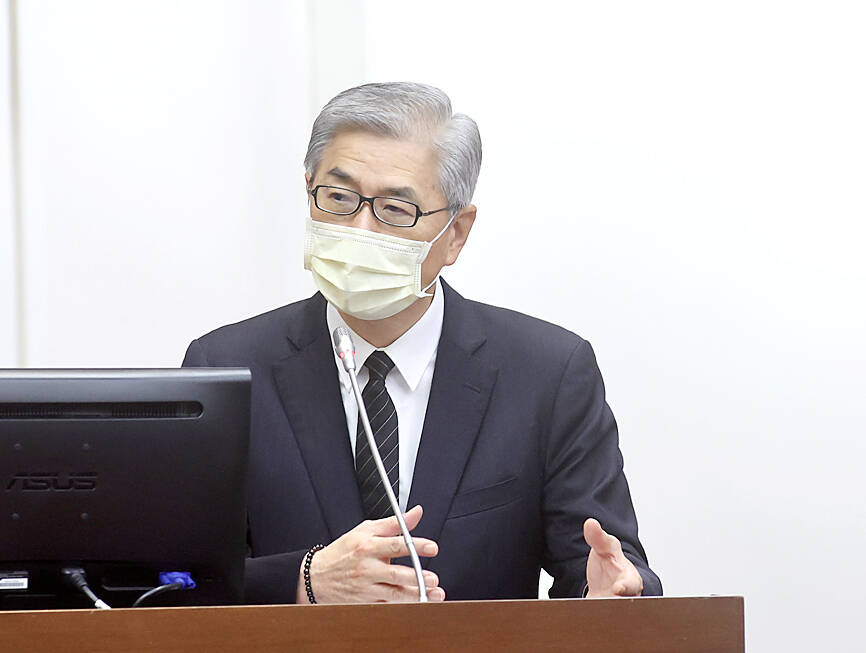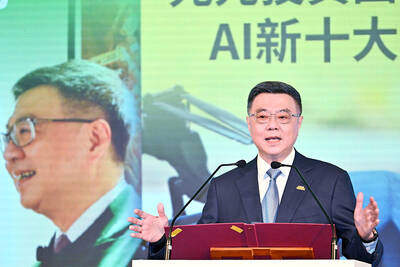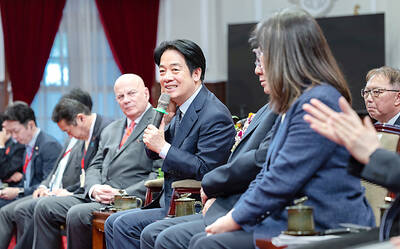The Financial Supervisory Commission (FSC) yesterday asked local banks and financial services providers to closely monitor their use of artificial intelligence (AI) tools such as ChatGPT, to protect data security.
The FSC told the Bankers’ Association (銀行公會) to investigate how many banks are using AI tools, how they use them and whether they have set risk controls, and to complete the review in two months.
Meanwhile, the Securities and Futures Bureau said it would investigate whether local securities companies have incorporated AI tools into their services, bureau Deputy Director Kao Ching-ping (高晶萍) told the Taipei Times by telephone yesterday.

Photo: CNA
Lawmakers on Thursday questioned whether the FSC was aware of the potential hazards involved in the use of large-language models, commonly referred to as AI.
No foreign financial regulator has taken a clear stance on the issue, although the Hong Kong Monetary Authority said the issue would eventually be discussed by international agencies, such as the Bank for International Settlements, FSC Chairman Thomas Huang (黃天牧) told legislators.
The FSC would research the risks to consumers first and decide how to set a framework, Huang said.
Banks seeking to use ChatGPT might risk data leaks, as they would be using customer information to interact with the software, which could incorporate that information into its own database, Banking Bureau Director-General Sherri Chuang (莊琇媛) said.
Even if banks use a special version of a large-language model for business, they should be aware of the data security risks and take precautions, Chuang said.
The Securities and Futures Bureau is unaware of any local securities company using ChatGPT as part of their equity research or customer service, but it would seek to confirm that, Kao said.
“There is no regulation banning securities companies from using new technology tools, but if the companies want to utilize the bot [ChatGPT], they must prevent data insecurity and be responsible for any financial advice they give to their clients, whether the advice based on their employees’ judgements or that of bots,” Kao said.
With ChatGPT gaining popularity worldwide, experts have been discussing whether it would replace financial services provided by humans, as the tool could analyze vast volumes of data quickly, and detect patterns and trends difficult for a person to spot.
However, when asked for advice on investing in local companies, the chatbot gave a neutral and conservative response.
It said that it cannot provide investment advice, which requires a thorough understanding of the investor’s financial situation, risk tolerance, investment goals and other factors.
Although some shares have performed well in the past, that performance is not a guarantee of future results, it added.

Two US House of Representatives committees yesterday condemned China’s attempt to orchestrate a crash involving Vice President Hsiao Bi-khim’s (蕭美琴) car when she visited the Czech Republic last year as vice president-elect. Czech local media in March last year reported that a Chinese diplomat had run a red light while following Hsiao’s car from the airport, and Czech intelligence last week told local media that Chinese diplomats and agents had also planned to stage a demonstrative car collision. Hsiao on Saturday shared a Reuters news report on the incident through her account on social media platform X and wrote: “I

STILL ON THE TABLE: The government is not precluding advanced nuclear power generation if it is proven safer and the nuclear waste issue is solved, the premier said Taiwan is willing to be in step with the world by considering new methods of nuclear energy generation and to discuss alternative approaches to provide more stable power generation and help support industries, Premier Cho Jung-tai (卓榮泰) said yesterday. The government would continue to develop diverse and green energy solutions, which include considering advances in nuclear energy generation, he added. Cho’s remarks echoed President William Lai’s (賴清德) comments in an interview last month, saying the government is not precluding “advanced and newer nuclear power generation” if it is proven to be safer and the issue of nuclear waste is resolved. Lai’s comment had

‘BUILDING PARTNERSHIPS’: The US military’s aim is to continue to make any potential Chinese invasion more difficult than it already is, US General Ronald Clark said The likelihood of China invading Taiwan without contest is “very, very small” because the Taiwan Strait is under constant surveillance by multiple countries, a US general has said. General Ronald Clark, commanding officer of US Army Pacific (USARPAC), the US Army’s largest service component command, made the remarks during a dialogue hosted on Friday by Washington-based think tank the Center for Strategic and International Studies. Asked by the event host what the Chinese military has learned from its US counterpart over the years, Clark said that the first lesson is that the skill and will of US service members are “unmatched.” The second

STANDING TOGETHER: Amid China’s increasingly aggressive activities, nations must join forces in detecting and dealing with incursions, a Taiwanese official said Two senior Philippine officials and one former official yesterday attended the Taiwan International Ocean Forum in Taipei, the first high-level visit since the Philippines in April lifted a ban on such travel to Taiwan. The Ocean Affairs Council hosted the two-day event at the National Taiwan University Hospital International Convention Center. Philippine Navy spokesman Rear Admiral Roy Vincent Trinidad, Coast Guard spokesman Grand Commodore Jay Tarriela and former Philippine Presidential Communications Office assistant secretary Michel del Rosario participated in the forum. More than 100 officials, experts and entrepreneurs from 15 nations participated in the forum, which included discussions on countering China’s hybrid warfare